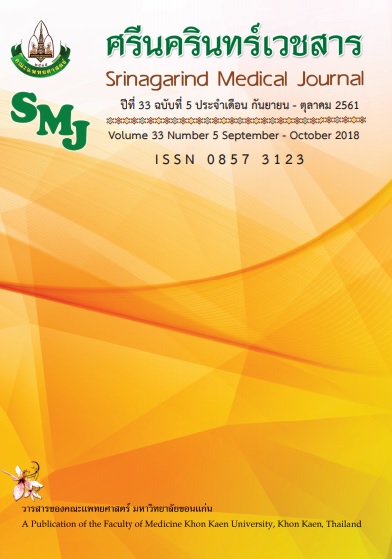Development of Checklists to Support Community Pharmacists to Interview and Retrieve Information from Pediatric Patients Coming with Common Illnesses
Keywords:
Delphi technIQRue; checklist questions; community pharmacyAbstract
Background and Objective: Children with common illnesses presenting at community pharmacies may have more serious conditions. Patient interviews can identify these problems and this study aimed to develop a checklist to help community pharmacists identify and refer children with serious conditions.
Method: A questionnaire based on the Integrated Management of Childhood Illnesses concept of the World Health Organization was developed and assessed using the Delphi technique by a panel of pediatricians across Thailand. The questionnaire contained questions related to the clinical manifestations of fever, cough, runny nose, vomiting and diarrhea. Respondents assessed the quality of each question on a scale of 1 to 5 and mean, mode and inter quartile range (IQR) were calculated. Items with a mean of not less than 4 out of 5 points and an IQR between 0 – 1.5 were chosen to construct the checklists.
Result: For patients presenting with fever, 8 questions and 10 signs or symptoms that indicate referral were identified. Similarly, 10 questions and 8 signs and symptoms were identified for patients with cough, 7 questions and 3 signs and symptoms for patients with runny nose, 7 questions and 7 signs and symptoms for patients with vomiting and 9 questions and 7 signs and symptoms were identified for patients with diarrhea.
Conclusion: The checklists to identify serious conditions for referral has been constructed and is ready to be tested in children aged 2 months to 5 years attending pharmacies with fever, cough, runny nose, vomiting or diarrhea.
References
2. สุรศักดิ์ ไชยสงค์, สุนันทา โอศิริ, วิลาสินี หิรัญพานิช, สมศักดิ์ อาภาศรีทองสกุล, พุฒิพงศ์ สัตยวงศ์ทิพย์. การบริการปฐมภูมิของร้านยาในระบบประกันสุขภาพ: กรณีศึกษาร้านยามหาวิทยาลัย ภายใต้โครงการหลักประกันสุขภาพแห่งชาติ. รายงานของสถาบันวิจัยระบบสาธารณสุข; พฤษภาคม 2548.
3. ระพีพรรณ ฉลองสุข, สุรสิทธิ์ ล้อจิตรอำนวย. ความพึงพอใจของผู้รับบริการต่อร้านยาในระบบประกันสุขภาพถ้วนหน้า: กรณีศึกษา ณ ร้านยาเภสัชกรรมชุมชน ของโรงพยาบาลสมเด็จพระยุพราชสว่างแดนดิน. วารสารวิจัยวิทยาศาสตร์การแพทย์ 2549; 20: 41-58.
4. World Health Organization, WHO. Integrated Management of Childhood Illness (IMCI). [cited Jun 5, 2016]. Available from:URL:http://www.who.int/gho/child_health/en/
5. World Health Organization, WHO. Chart Booklet. Integrated Management of Childhood Illness. [cited Jun 9, 2016]. Available from:URL:.http://apps.who.int/iris/bitstream/handle/10665/104772/
9789241506823_Chartbook_eng.pdf
6. Gouws E, Bryce J, Habicht JP, Amaral J, Pariyo G, Schellenberg JA, et al. Improving Antimicrobial Use among Health Workers in First- Level Facilities:Results from the Multi-Country Evaluation of the Integrated Management of Childhood Illness Strategy. Bull World Health Organ 2004; 82: 509–15.
7. Amaral J, Gouws E, Bryce J, Leite AJ, Cunha AL, Victora CG. Effect of Integrated Management of Childhood Illness ( IMCI) on Health Worker Performance in Northeast-Brazil. Cad Saude Publica 2004; 20(Suppl2): 209–19.
8. Chopra M, Patel S, Cloete K, Sanders D, Petersons S. Effect of an IMCI Intervention on Quality of Care across Four Districts in Cape Town, South Africa. Arch Dis Child 2005; 90: 397–401.
9. Ghimire M, Pradhan YV, Maskey MK. Community-Based Interventions for Diarrhoeal Diseases and Acute Respiratory Infections in Nepal. Bull World HealthOrgan 2010; 88: 216–21.
10. El MahalliAA, Akl OA. Effect of adopting integrated management of Childhoodillness guidelines on drug use at a primary health care center: A case study from Egypt. J Family Community Med 2011; 18: 118-23.
11. Hicks C. The Delphi technIQRue. Research methods for clinical therapists. Philadelphia: Churchill living stone.; 2000: 261-7.
12. กาญจนา ตั้งนรารัชชกิจ. คู่มือกุมารเวชศาสตร์ฉุกเฉิน. พิมพ์ครั้งที่5. กรุงเทพฯ : บริษัท พิมพ์สวยจำกัด; 2554.
13. ศรีศุภลักษณ์ สิงคาลวณิช. ปัญหาโรคเด็กที่พบบ่อย. สถาบันสุขภาพเด็กแห่งชาติมหาราชินี. กรุงเทพฯ; 2549.
14. ปราณี ทองคำ. เครื่องมือวัดผลทางการศึกษา. ปัตตานี: มหาวิทยาลัยสงขลานครินทร์; 2539.
15. Jensen C. Delphi in depth: Power technIQRues from the experts Berkeley. Singapore: McGraw Hill; 1996.
16. Ziglio E. The Delphi method and its contribution to decision making. In: Adler M, Ziglio E, editors. Gazing into the oracle: The Delphi method and its application to social policy and public health. London: Jessica Kingley Publisher; 1996: 3-33.
17. ปรีชา มนทกานติกุล. แนวคิดการบริบาลทางเภสัชกรรมกับศูนย์สุขภาพชุมชน. ใน: ปวีณา สนธิสมบัติ, จันทรรัตน์ สิทธิวรนันท์, อรรถการ นาคำ, บรรณาธิการ. การให้บริบาลทางเภสัชกรรมในศูนย์สุขภาพชุมชน. ภาควิชาเภสัชกรรมปฏิบัติ คณะเภสัชศาสตร์ มหาวิทยาลัยนเรศวร: คณะเภสัชศาสตร์ มหาวิทยาลัยนเรศวร: 2545: 14-24.
18. เฉลิมศรี ภุมมางกูร. การบูรณาการกิจกรรมเภสัชกรรมคลินิกสู่การบริบาลทางเภสัชกรรม. วารสารเภสัชกรรมคลินิก. 2546; 11: 49-60.
19. Mast R, Ahmad A, Hoogenboom SC, Cambach W, Elders PJ, Nijpels G, et al. Amsterdam tool for clinical medication review : development and testing of a comprehensive tool for pharmacists and general practitioners. BMC Res Notes 2015; 8; 642.
20. Sriram D, Mcmanus A, Pgraddipph MPH, Biol BH, Emmerton L, Hons B, et al. Development and validation of a clinical decision-making aid for screening bowel symptoms in community pharmacies. J EvalClin Pract 2014; 20: 260–6.
21. Bleske BE, Dillman NO, Cornelius D, Ward JK, Burson SC, Diez HL, et al. Heart failure assessment at the community pharmacy level : A feasibility pilot study. J Am Pharm Assoc 2014;54: 634–41.




